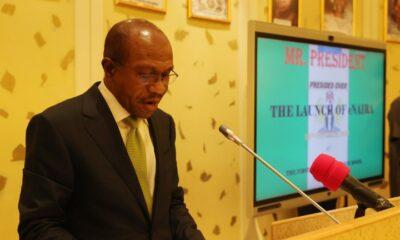- Borders to Remain Shut Until Neighbouring Nations Meet Requirements
The Governor of the Central Bank of Nigeria, Godwin Emefiele, has said Nigeria’s land borders will remain closed until the country’s neighbours meet requirements.
The governor, who spoke with journalists after a brief meeting with President Muhammadu Buhari in Abuja on Monday, said the government closed the land borders to curb smuggling and illegal trading activities.
Emefiele explained that until neighbouring countries have concrete engagements on mutual anti-smuggling policies the borders will remain closed as it undermines Nigeria’s economic policy.
“We are not saying that the borders should be closed in perpetuity, but that before the borders are reopened, there must be concrete engagements with countries that are involved in using their ports and countries as landing ports for bringing in goods meant for local consumption, it is understandable,” Emefiele said.
“But the fact that those products are landed in their countries and then transshipped or smuggled into Nigeria is something that I am sure you all agree as Nigerians we should not allow happening because it undermines our economic policy, it undermines our own desire to make sure that industries are alive and jobs are created in Nigeria.”
The CBN governor further explained that Nigeria’s rice and poultry farmers have recorded substantial improvements in sales since the borders have been closed.
“Recently, and this is the absolute truth, about two weeks before the border closure, the chairman of the Rice Processors Association, incidentally, he owns Umza Rice in Kano, called me and said that all the rice millers and processors are having in their warehouses nothing less than 25,000 metric tons of milled rice. That this rice has been unsold because of the smuggling and dumping through Republic of Benin and other border posts that we have in the country and that he would want us to do something about it,” he said.
“Secondly, we also have members of the Poultry Association of Nigeria who also complained that they have thousands of crates of eggs that they could not sell together with even some of the processed chickens also arising from the problem of smuggling and dumping of poultry products into Nigeria.
“A week after the borders were closed, the same rice millers association called to tell us that all the rice that they had in their warehouses have all been sold. Indeed, a lot of people have been depositing money in their accounts and they have even been telling them ‘please hold on don’t even pay money yet until we finished processing your rice’.
“The Poultry Associations have also come to say that they have sold all their eggs, they have sold all their processed chickens and that demand is rising.”
Therefore, Emefiele said growing local patronage and other plugged leakages like the daily petrol consumption that dramatically dropped from 60 million litres per day to 52 million litres and the surged in revenue generation, duty payment, recorded in recent months are some of the benefits of the border closure.
“So when you asked, what is the benefit of the border closure on the economy of Nigeria, I just used two products – poultry and rice. The benefit is that it has helped to create jobs for our people, it has helped to bring the integrated rice milling that we have in the country back into business again and they are making money. Our rural communities are bubbling because there are activities because rice farmers are able to sell their paddy. The poultry business is also doing well, and also maize farmers who produce maize from which feeds are produced are also doing business. These are the benefits,” he said.



 Naira4 weeks ago
Naira4 weeks ago


 Naira3 weeks ago
Naira3 weeks ago


 News4 weeks ago
News4 weeks ago
 Travel4 weeks ago
Travel4 weeks ago




 Naira4 weeks ago
Naira4 weeks ago
 Naira3 weeks ago
Naira3 weeks ago


 Jobs3 weeks ago
Jobs3 weeks ago


 Travel3 weeks ago
Travel3 weeks ago



















